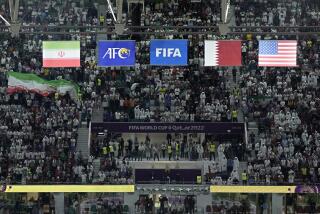Arms show in Emirates leads to $4.6 billion in deals
- Share via
BEIRUT — An international economic crisis has clobbered stock markets, banks and real estate sectors in the oil-rich Persian Gulf -- but not the region’s appetite for weapons.
Amid the global financial downturn, the United Arab Emirates this week held one of the biggest arms shows in the world, with extensive exhibits of often high-tech weapons including stun and smoke grenades, guided missiles, armored vehicles and naval vessels.
The four-day show, which ended Thursday, came amid continued tensions between the West and Iran over accusations that Tehran is seeking to gather the components for a nuclear weapons program, an issue of high concern to Persian Gulf states.
The Abu Dhabi International Defense Exhibition and Conference, or IDEX, saw the signing of major deals between weapons-developing companies and states in the region.
On Tuesday, the Emirates government signed nearly $3 billion in deals at the show with Boeing Co. and Lockheed Martin Corp. to buy military transport aircraft, the official news agency WAM reported.
The Emirates’ military has committed itself to buy four C-17 aircraft from Chicago-based Boeing and 12 C-130 aircraft from Bethesda, Md.-based Lockheed, said Obaid Ketbi, chairman of IDEX, who said it was part of a plan “to modernize and develop the country’s air transport fleet.”
The efforts in Iran and other Middle Eastern countries to acquire nuclear technology were never far from the minds of participants.
One seminar examined “potential security hazards” and “specific responses to possible nuclear accidents” as the “development of nuclear energy programs continue apace across the Gulf and the wider Middle East,” according to the website of the biennial show.
Peter Felstead, editor of Jane’s Defense Weekly, a magazine on military and corporate affairs, said countries in the region were worried about Iran’s nuclear program.
The UAE also signed up to acquire a high-altitude air defense system to address concerns about possible missile attacks from Iran, he said in a telephone interview.
So far, the arms deals signed at the ninth annual IDEX total $4.6 billion, Felstead said.
“We had the impression that the arms contracts signed at the exhibition had been planned for a long time and were not affected by the international crisis,” he said.
The organizers of IDEX announced that the six members of the Gulf Cooperation Council -- Bahrain, Kuwait, Oman, Qatar, Saudi Arabia and the Emirates -- are expected to spend about $59 billion on defense this year.
Raytheon, one of the biggest U.S. defense contractors, announced earlier at the exhibition that it had sold 224 advanced missiles to the UAE for its F-16 warplanes. The Emirates government has agreed with Washington on a letter of offer and acceptance for the purchase of Raytheon’s advanced medium-range air-to-air missiles. The deal was described as “sizable” by company officials.
“This show is one of the top shows for ground-force-oriented systems. It has expanded beyond imagination,” said P.T. Mikolashek, president of Raytheon Middle East & North Africa.
“We enjoy a great presence here, and this allows us to meet our customers here in the region and beyond,” he said in a telephone interview, adding that so far the financial crunch had not affected deals signed between the company and other governments in the Middle East.
This year’s show, which was expected to draw more than 40,000 visitors and boasted 900 exhibitors from 50 nations, also focused on domestic security, including displays of new technologies and services such as robots to locate and defuse explosives.
More to Read
Sign up for Essential California
The most important California stories and recommendations in your inbox every morning.
You may occasionally receive promotional content from the Los Angeles Times.










